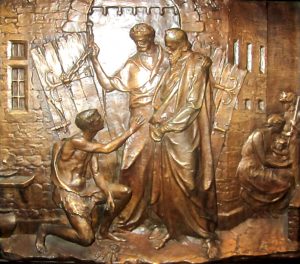Illuminations on the Lectionary readings for June 1, 2025 (Easter 7C)

A Jailer, Paul, Silas, and the Jailer’s Family (1893); bronze metalwork panel on the north door of Trinity Church, Manhattan. Design by Richard Morris Hunt (1827-1895), produced by Charles Henry Hiehaus; Donated by William Waldorf Astor in memory of his father, John Jacob Astor III. (Click image to enlarge.)
First Reading: Acts 16:16-34
On this last Sunday of Eastertide, our first reading finds Paul still in Philippi, where he encounters a woman possessed by a demon. She has been held as a slave by men who present her as a fortune teller because her loud shouts sound prophetic. She follows Paul and Silas around, declaring them “slaves of the most high God,” until Paul, annoyed, silences her shouts by casting the spirit out of her. Her masters, angry because her healing means the loss of their income, have Paul and his companions jailed for disturbing the peace. When they pray for relief, an earthquake bursts open the prison doors and breaks their chains. Paul and his companions refuse to leave, though, to protect the jailer from punishment. The grateful jailer asks them how he can be saved, and Paul tells him to believe in Christ.
Psalm: Psalm 97
This psalm of thanks and praise begins with language that may seem difficult for modern ears. It confronts us with the loud, chest-thumping shouts of Bronze Age warriors, a poetic genre that’s difficult to imagine in a modern context. Perhaps it’s best to peek at the ending of this story to see how it comes out: It’s a happy ending, reassuring us that God brings light and joy for the righteous and the upright in heart. Practice righteousness, the Psalmist advises. Insist on justice for the weak, not just for the strong; resist evil, and give thanks that God loves us.
Second Reading: Revelation 22:12-14, 16-17, 20-21
At the end of Pentecost, we come to the closing verses of Revelation. This lectionary passage skips past a couple of alarming verses, apparently in order to focus on Revelation’s promise: Many in the early church expected that the Lamb – the sacrificed and resurrected Jesus Christ – would return soon, perhaps even during their own lifetimes. Two thousand years later, we recognize that life, eternity, and God’s kingdom aren’t that simple. But Revelation’s message of the Lamb still brings us hope: “Let everyone who is thirsty come. Let anyone who wishes take the water of life as a gift. … Come, Lord Jesus!”
Gospel: John 17:20-26
John’s extended four-chapter narrative that we hear in parts during Eastertide started after Jesus had washed his disciples’ feet and celebrated a last supper with them. Now it concludes, just before Jesus will go out to the garden to pray, where Judas and the soldiers will come in the night to take him away to be brought before Pilate and crucified. In these familiar verses, we hear Jesus asking God to love everyone just as God has loved Jesus. Yes, everyone: Jesus prays not only for his friends in the room then and there, but asks God to love all the people of the world, promising that all who believe in him “may be one, as we are one, I in them and you in me.”
